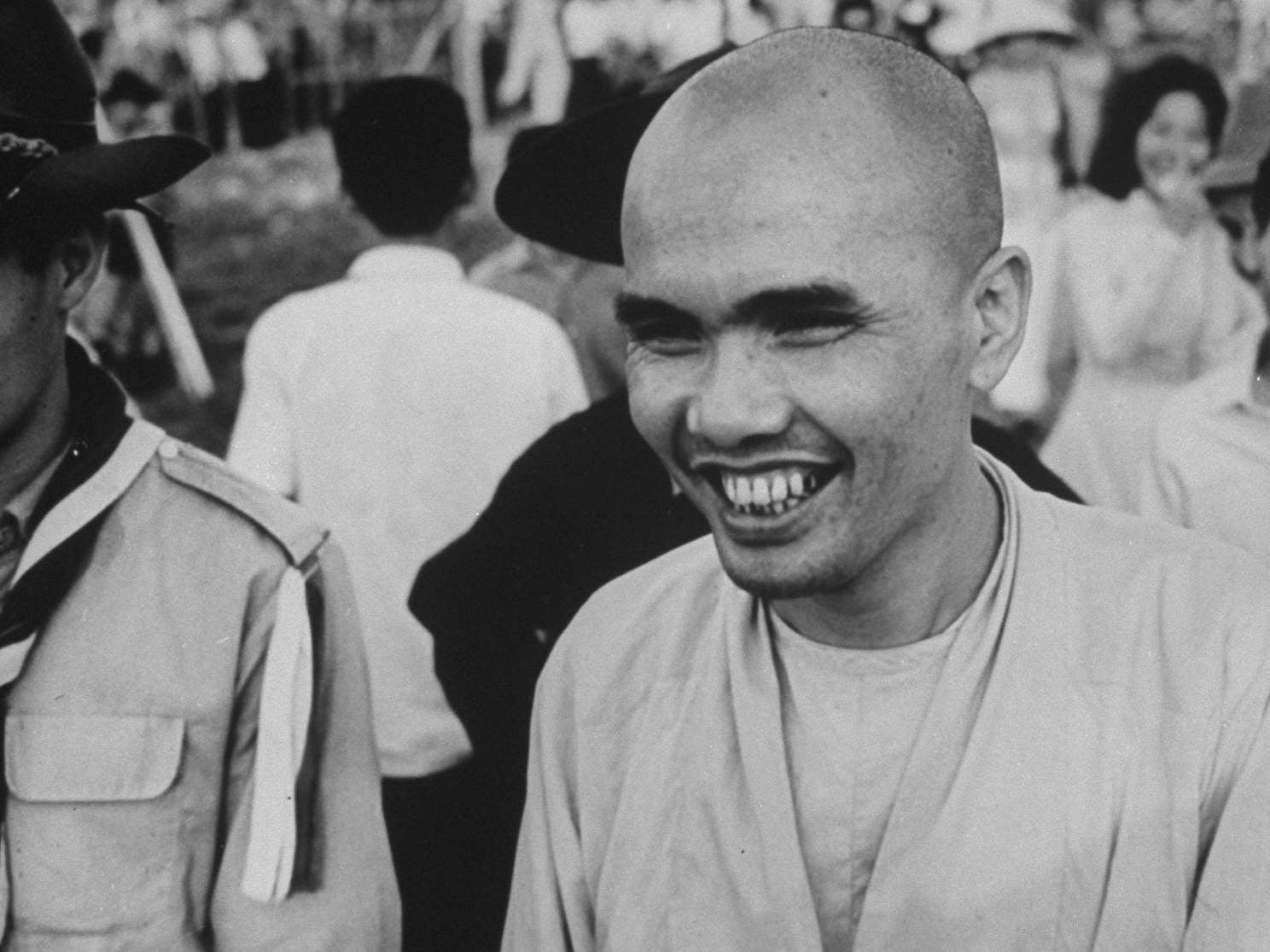Thich Tri Quang: Buddhist monk who wielded political might during the Vietnam War
He led protests that brought down the South Vietnamese president, and played a key role in shifting US opinion against the war

Thich Tri Quang was a Buddhist monk who led waves of protests that brought down South Vietnamese president Ngo Dinh Diem in 1963 and later contributed to growing American ambivalence about the Vietnam War.
For about three years during a critical phase of the war, from 1963 to 1966, Tri Quang, who has died aged 95, commanded headlines as a figure of international interest if not outright intrigue. Clad in grey robes, he appeared on the front of Time magazine in 1966. “Lean, well muscled, with a sensual electricity, in every gesture and blazing eyes that can mesmerise a mob, Thich Tri Quang … has long been South Vietnam’s mysterious High Priest of Disorder,” the article read.
Part of the fascination surrounding Tri Quang – Thich is a religious title, akin to the reverend – stemmed from what to western observers sometimes seemed the contradictory nature of his objectives. He was variously described as the great champion of Vietnam’s Buddhist majority and a radical sowing political dissent in an already tortured land. At times, he was called a communist; at other times an anti-communist.
In 1963 he was granted a haven in the US embassy in South Vietnam after escaping government raids on Buddhist pagodas. But by 1966 he charged that Vietnam was “oppressed by two pressures: the communists and the Americans”.
Tri Quang (the name means “brilliant mind”) was born Pham Quang in Diem Dien, a village in the central province of Quang Binh that would later become part of the communist North. He was the son of a farmer and became a monk at age 12 or 13, a practice not unusual in Vietnam. He settled in Hue, which after 1954 became part of South Vietnam.
Early on, Tri Quang was inspired by the struggle against the French colonial rule that ended with the conclusion of the first Indochina war in 1954 and the division of Vietnam at the 17th parallel. He was also concerned with what he described as the “unity of the Buddhist faithful” across Vietnam.
He first came to prominence in 1963 as a leader of protests that led to the ousting of Diem, the first president of South Vietnam, in a US-backed coup that November. Diem was Catholic, with a brother who was a powerful archbishop, and most of the protesters seeking his overthrow were Buddhist.
Tri Quang reportedly employed spies in the Diem government and armed monks with insecticide sprayers filled with vinegar and red pepper. Hostilities reached a flash point on on 8 May 1963, when South Vietnamese soldiers fired on a group of Buddhists flying a Buddhist flag in Hue. Nine people were killed.
Protests culminated with the ritual suicide a month later of the Buddhist monk Thich Quang Duc, who was soaked with gasoline and then sat lotus style as he burnt to death on a Saigon street. That image ricocheted around the world and pushed President John F Kennedy to reconsider US support for Diem, who was ultimately assassinated in the coup.
After Diem’s death, to the chagrin of US officials who wished to see a more stable South Vietnam amid the ongoing war with the North, Tri Quang mobilised his followers to help overthrow a succession of governments and their holdovers from the Diem regime.
A second Buddhist uprising, again with Tri Quang as a principal leader, erupted in 1966 during the government of Nguyen Cao Ky, revealing the extent of fissures within South Vietnamese society and government.
The protests, which were eventually crushed, were regarded as an unwelcome development in the US, which by then had deepened its involvement in war with the deployment of combat troops.
Little is known about Tri Quang’s activities after the end of the Vietnam War. He reportedly spent a period under house arrest at his pagoda. In its 1966 cover story, Time reported that Tri Quang lived for at least one period in a small cell at his pagoda, where he did not partake of meat, cigarettes or alcohol. He rose with the sun, a reporter wrote, “spending a third of his waking day in prayer, a third in activity, a third in contemplation of his mistakes”.
Thich Tri Quang, Buddhist monk and anti-war activist, born 21 December 1923, died 8 November 2019
Paul Mooney in Hanoi contributed to this report
© Washington Post
Subscribe to Independent Premium to bookmark this article
Want to bookmark your favourite articles and stories to read or reference later? Start your Independent Premium subscription today.

Join our commenting forum
Join thought-provoking conversations, follow other Independent readers and see their replies